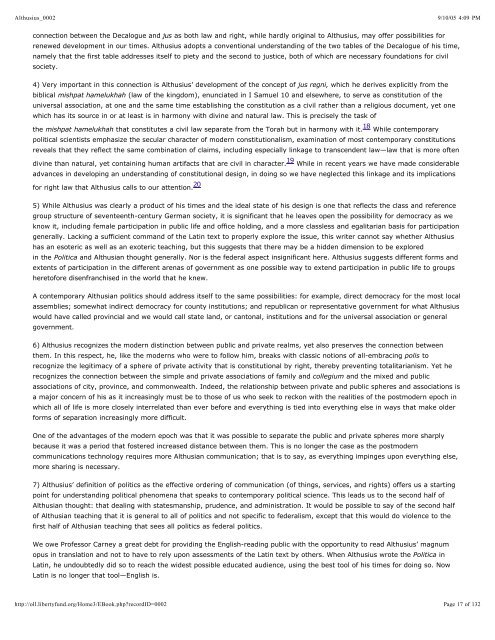Johannes Althusius: Politica - Hubertlerch.com - HubertLerch.com
Johannes Althusius: Politica - Hubertlerch.com - HubertLerch.com
Johannes Althusius: Politica - Hubertlerch.com - HubertLerch.com
Create successful ePaper yourself
Turn your PDF publications into a flip-book with our unique Google optimized e-Paper software.
<strong>Althusius</strong>_0002<br />
9/10/05 4:09 PM<br />
connection between the Decalogue and jus as both law and right, while hardly original to <strong>Althusius</strong>, may offer possibilities for<br />
renewed development in our times. <strong>Althusius</strong> adopts a conventional understanding of the two tables of the Decalogue of his time,<br />
namely that the first table addresses itself to piety and the second to justice, both of which are necessary foundations for civil<br />
society.<br />
4) Very important in this connection is <strong>Althusius</strong>’ development of the concept of jus regni, which he derives explicitly from the<br />
biblical mishpat hamelukhah (law of the kingdom), enunciated in I Samuel 10 and elsewhere, to serve as constitution of the<br />
universal association, at one and the same time establishing the constitution as a civil rather than a religious document, yet one<br />
which has its source in or at least is in harmony with divine and natural law. This is precisely the task of<br />
the mishpat hamelukhah that constitutes a civil law separate from the Torah but in harmony with it.<br />
18<br />
While contemporary<br />
political scientists emphasize the secular character of modern constitutionalism, examination of most contemporary constitutions<br />
reveals that they reflect the same <strong>com</strong>bination of claims, including especially linkage to transcendent law—law that is more often<br />
divine than natural, yet containing human artifacts that are civil in character.<br />
19<br />
While in recent years we have made considerable<br />
advances in developing an understanding of constitutional design, in doing so we have neglected this linkage and its implications<br />
for right law that <strong>Althusius</strong> calls to our attention.<br />
20<br />
5) While <strong>Althusius</strong> was clearly a product of his times and the ideal state of his design is one that reflects the class and reference<br />
group structure of seventeenth-century German society, it is significant that he leaves open the possibility for democracy as we<br />
know it, including female participation in public life and office holding, and a more classless and egalitarian basis for participation<br />
generally. Lacking a sufficient <strong>com</strong>mand of the Latin text to properly explore the issue, this writer cannot say whether <strong>Althusius</strong><br />
has an esoteric as well as an exoteric teaching, but this suggests that there may be a hidden dimension to be explored<br />
in the <strong>Politica</strong> and Althusian thought generally. Nor is the federal aspect insignificant here. <strong>Althusius</strong> suggests different forms and<br />
extents of participation in the different arenas of government as one possible way to extend participation in public life to groups<br />
heretofore disenfranchised in the world that he knew.<br />
A contemporary Althusian politics should address itself to the same possibilities: for example, direct democracy for the most local<br />
assemblies; somewhat indirect democracy for county institutions; and republican or representative government for what <strong>Althusius</strong><br />
would have called provincial and we would call state land, or cantonal, institutions and for the universal association or general<br />
government.<br />
6) <strong>Althusius</strong> recognizes the modern distinction between public and private realms, yet also preserves the connection between<br />
them. In this respect, he, like the moderns who were to follow him, breaks with classic notions of all-embracing polis to<br />
recognize the legitimacy of a sphere of private activity that is constitutional by right, thereby preventing totalitarianism. Yet he<br />
recognizes the connection between the simple and private associations of family and collegium and the mixed and public<br />
associations of city, province, and <strong>com</strong>monwealth. Indeed, the relationship between private and public spheres and associations is<br />
a major concern of his as it increasingly must be to those of us who seek to reckon with the realities of the postmodern epoch in<br />
which all of life is more closely interrelated than ever before and everything is tied into everything else in ways that make older<br />
forms of separation increasingly more difficult.<br />
One of the advantages of the modern epoch was that it was possible to separate the public and private spheres more sharply<br />
because it was a period that fostered increased distance between them. This is no longer the case as the postmodern<br />
<strong>com</strong>munications technology requires more Althusian <strong>com</strong>munication; that is to say, as everything impinges upon everything else,<br />
more sharing is necessary.<br />
7) <strong>Althusius</strong>’ definition of politics as the effective ordering of <strong>com</strong>munication (of things, services, and rights) offers us a starting<br />
point for understanding political phenomena that speaks to contemporary political science. This leads us to the second half of<br />
Althusian thought: that dealing with statesmanship, prudence, and administration. It would be possible to say of the second half<br />
of Althusian teaching that it is general to all of politics and not specific to federalism, except that this would do violence to the<br />
first half of Althusian teaching that sees all politics as federal politics.<br />
We owe Professor Carney a great debt for providing the English-reading public with the opportunity to read <strong>Althusius</strong>’ magnum<br />
opus in translation and not to have to rely upon assessments of the Latin text by others. When <strong>Althusius</strong> wrote the <strong>Politica</strong> in<br />
Latin, he undoubtedly did so to reach the widest possible educated audience, using the best tool of his times for doing so. Now<br />
Latin is no longer that tool—English is.<br />
http://oll.libertyfund.org/Home3/EBook.php?recordID=0002<br />
Page 17 of 132







